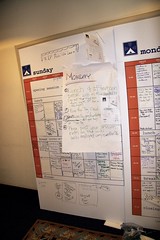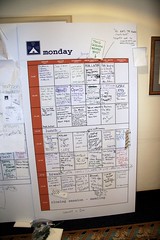Just like its U.S. counterpart, Euro Foo is a self-organising event so everyone is expected to contribute. After a short intro from the O'Reilly team, everyone descends on big planning boards and the schedule is drawn up. The main thing to note is that with 4x7 sessions on the Sunday and 6x6 sessions on the Monday you can only possibly see 10/64 talks -ÃÂ unless you're super-human or miss introductions and conclusions. Given that one of those talks should be yours, you're really only going to catch about 14% of the presentations! So you'd better make the most of the lunch breaks and the bar if you want to see everyone.
Sunday
The path I picked through Sunday's line-up found me trying to help Matt Jones build a Big Here Tricorder, being impressed by Gavin Starks' introduction to pledgebank-meets-Inconvenient-Truth site Global Cool, sneak-previewing Matt Webb's vision of the future of the web, and being wowed by Ben Gimpert's collection of projects loosely entitled The Shift Key.
Matt Jones' Build a Big Here Tricorder group split into three - Matt Webb and Simon Willison did an admirable job of not looking too miffed for being roped in at the last minute, but with Matt Jones out of the room the session was a little too scattered to deliver concrete results. That said, his group did go out to challenge Brussels passersby with samples from the Big Here question list, and probably had the most fun in the process! Suw has good notes on the specification session, and even though 45 minutes wasn't enough time I'd still be interested in seeing the list of resources that the implementation group pulled together.
Gavin Starks' talk basically covered the issues raised in Al Gore's presentation-cum-movie An Inconvenient Truth, but then outlined what we can do as individuals, through the Global Cool project, to help fix it. His example pledge, "I will reduce my carbon emissions by 1 tonne per year if 1 billion other people will too", indicates the audacious scope and ambition of the project.ÃÂ Take note.
Matt Webb's App After App talk stood out a bit because he actually spoke about the web. It's the glue that binds so many attendees, and many people's bread and butter, but it did feel neglected a little. It's refreshing to hear someone who's worked with the web for a while still be passionate about how it might change and where it's going next. Especially when so many other people are jaded, sick to death of web 2.0, and convinced it's "bubble all over again" and that they've seen it all before. (That said, as Jim points out on the Linden blog, there was a slightly bigger sense of purpose with the political and climate related talks, and it's nice to just think of the web as our tool for good, rather than our raison d'être.)
Ben Gimpert's presentation was an opportunity to see a friend run a single thread through a few great projects I was already familiar with. At one point only three people were there to see it, but I thought he deserved a bigger crowd so with an inappropriately loud cheer and a round of applause we pulled in an extra dozen people from the hallway. The cheekiness paid off I think. As Ben says on the Euro Foo wiki "At 5pm on Sunday in the Henriette room, I gave a talk called The Shift Key. Matt Webb and Tom Carden screamed, Tim O'Reilly read poetry".
Monday
I ran a very short-notice Ask Later session first thing on Monday, and then attended Rob McKinnon's Government on Rails session, an O'Reilly talk on Content 2.0, a group discussion hosted by Claus Dahl about prototying real world devices in Second Life, and a group discussion hosted by Schuyler Erle around OpenStreetMap-alike open geodata.
My Ask Later session was again based around the Pecha Kucha 20x20 format. In future I'd like us to experiment with different constraints (perhaps Takahashi or Kawasaki?)., but I still think this one is the most fun.ÃÂ Early morning attendees who braved their Leffe-fuelled hangovers were subjected to short-form presentations from:
- me, reprising my talk from Ask Later #1
- Alice Taylor, on games and her work at the BBC
- Claus Dahl, on del.icio.us and how people put sense, not facts, into web search
- Euan Adie, on science blog aggregation and Post Genomic
- Piers Cawley, on tips for taking good portrait photos and how to have a good portrait photo taken of you
- Matt Webb, on sci-fi he likes, and
- Ben Gimpert, on the Theomatics of Food and the fractal nature of taste across menu, plate and dish.
Rob McKinnon's Government on Rails introduced his kiwi version of TheyWorkForYou - TheyWorkForYou.co.nz - hopefully launching real soon now. Rob also covered his greasemonkey and del.icio.us prototypes showing that you can make useful government watching tools without expensive hosting.ÃÂ Government Hacks, anyone?
The Content 2.0 talk was interesting for an insight into where O'Reilly might be headed with tech publishing.ÃÂ I'm glad to hear that (publicly at least) they don't know yet how they might monetise things like wiki books, but they're still trying them anyway.ÃÂ I was a little skeptical about the analogies between the itunes 99c per song pricing model and the idea of selling book chapters in a similar way (mainly because an ipod holds 10,000 songs, but I'm sure as hell not dropping 10 grand to fill it up - the business model needs to change).ÃÂ I think as soon asÃÂ your book chapters stand entirely alone, you don't need to be selling a book anymore.ÃÂ This brought to mind Steven Johnson's description of Everything Bad, where he said he needed 200 pages of sustained, linear argument to help make a coherent point.ÃÂ I think a book also stands for sustained development andÃÂ that's why draft books don't interest me too much -ÃÂ they're half-baked. The book isn't the paper, it's the work it stands for and the body of coherent knowledge within the paper.
The talk around Second Life at Euro Foo was very interesting. It's only a niche interest of mine, but I've followed virtual communities as a curious outsider (and one-time academic) for some time now (see del.icio.us/TomC/virtual_communities).ÃÂ ItÃÂ seemed that between the Imity folks prototyping in Second Life, Alice Turner's BBC projects and the official Second Life people there was a very healthy interest around these topics.
Lastly, Schuyler's geoscopes session was really interesting.ÃÂ We focused mainly on a ubiquitious andÃÂ consumer-friendly end-to-end GIS tool chain.ÃÂ I got to wear my OpenStreetMap hat a while, and the input from people like Tom Steinberg on running big volunteer projects was invaluable.ÃÂ Andrew Turner spoke more about the links between GeoPress and Mapufacture, and we segued for a while into brainstorming a P2P cache for satellite imagery in applications such as NASA WorldWind (for all I know Google Earth already does this).ÃÂ There's a real sense of "we know how to build this" around the mapping and geo hacking arena at the moment.ÃÂ We just need to get stuff done!
Winding Down
On Monday night we finally stepped out of the hotel and went to a restaurant called Strofilia.ÃÂ It was possibly both the best Greek food I've had and some of the nicest veggie food I've experienced on the continent.ÃÂ Criminally for someone based in central London, this trip was my first time on Eurostar and my first time in Brussels (for more than an hour).ÃÂ I didn't stay for EurOSCON but it sounds like folks had a blast,ÃÂ so here's to more Eu'Reilly events in Europe,ÃÂ and let's get some more folks on the Eu'Radar.
ÃÂ

